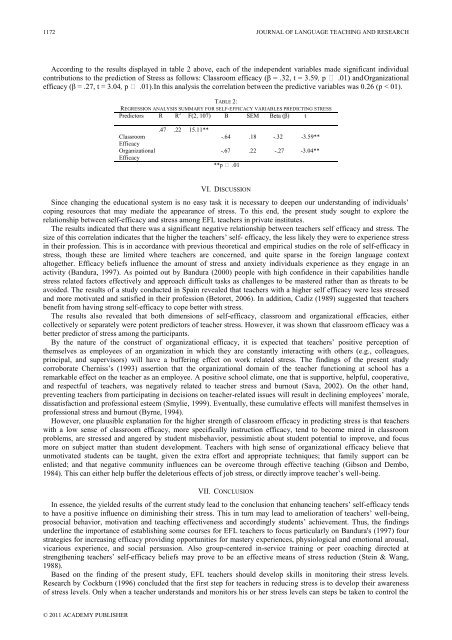Journal of Language Teaching and Research Contents - Academy ...
Journal of Language Teaching and Research Contents - Academy ...
Journal of Language Teaching and Research Contents - Academy ...
Create successful ePaper yourself
Turn your PDF publications into a flip-book with our unique Google optimized e-Paper software.
1172<br />
© 2011 ACADEMY PUBLISHER<br />
JOURNAL OF LANGUAGE TEACHING AND RESEARCH<br />
According to the results displayed in table 2 above, each <strong>of</strong> the independent variables made significant individual<br />
contributions to the prediction <strong>of</strong> Stress as follows: Classroom efficacy (β = .32, t = 3.59, p ˂ .01) <strong>and</strong> Organizational<br />
efficacy (β = .27, t = 3.04, p ˂ .01). In this analysis the correlation between the predictive variables was 0.26 (p < 01).<br />
TABLE 2:<br />
REGRESSION ANALYSIS SUMMARY FOR SELF-EFFICACY VARIABLES PREDICTING STRESS<br />
Predictors R R 2 F(2, 107) B SEM Beta (β) t<br />
.47 .22 15.11**<br />
Classroom -.64 .18 -.32 -3.59**<br />
Efficacy<br />
Organizational -.67 .22 -.27 -3.04**<br />
Efficacy<br />
**p ˂ .01<br />
VI. DISCUSSION<br />
Since changing the educational system is no easy task it is necessary to deepen our underst<strong>and</strong>ing <strong>of</strong> individuals’<br />
coping resources that may mediate the appearance <strong>of</strong> stress. To this end, the present study sought to explore the<br />
relationship between self-efficacy <strong>and</strong> stress among EFL teachers in private institutes.<br />
The results indicated that there was a significant negative relationship between teachers self efficacy <strong>and</strong> stress. The<br />
size <strong>of</strong> this correlation indicates that the higher the teachers’ self- efficacy, the less likely they were to experience stress<br />
in their pr<strong>of</strong>ession. This is in accordance with previous theoretical <strong>and</strong> empirical studies on the role <strong>of</strong> self-efficacy in<br />
stress, though these are limited where teachers are concerned, <strong>and</strong> quite sparse in the foreign language context<br />
altogether. Efficacy beliefs influence the amount <strong>of</strong> stress <strong>and</strong> anxiety individuals experience as they engage in an<br />
activity (B<strong>and</strong>ura, 1997). As pointed out by B<strong>and</strong>ura (2000) people with high confidence in their capabilities h<strong>and</strong>le<br />
stress related factors effectively <strong>and</strong> approach difficult tasks as challenges to be mastered rather than as threats to be<br />
avoided. The results <strong>of</strong> a study conducted in Spain revealed that teachers with a higher self efficacy were less stressed<br />
<strong>and</strong> more motivated <strong>and</strong> satisfied in their pr<strong>of</strong>ession (Betoret, 2006). In addition, Cadiz (1989) suggested that teachers<br />
benefit from having strong self-efficacy to cope better with stress.<br />
The results also revealed that both dimensions <strong>of</strong> self-efficacy, classroom <strong>and</strong> organizational efficacies, either<br />
collectively or separately were potent predictors <strong>of</strong> teacher stress. However, it was shown that classroom efficacy was a<br />
better predictor <strong>of</strong> stress among the participants.<br />
By the nature <strong>of</strong> the construct <strong>of</strong> organizational efficacy, it is expected that teachers’ positive perception <strong>of</strong><br />
themselves as employees <strong>of</strong> an organization in which they are constantly interacting with others (e.g., colleagues,<br />
principal, <strong>and</strong> supervisors) will have a buffering effect on work related stress. The findings <strong>of</strong> the present study<br />
corroborate Cherniss’s (1993) assertion that the organizational domain <strong>of</strong> the teacher functioning at school has a<br />
remarkable effect on the teacher as an employee. A positive school climate, one that is supportive, helpful, cooperative,<br />
<strong>and</strong> respectful <strong>of</strong> teachers, was negatively related to teacher stress <strong>and</strong> burnout (Sava, 2002). On the other h<strong>and</strong>,<br />
preventing teachers from participating in decisions on teacher-related issues will result in declining employees’ morale,<br />
dissatisfaction <strong>and</strong> pr<strong>of</strong>essional esteem (Smylie, 1999). Eventually, these cumulative effects will manifest themselves in<br />
pr<strong>of</strong>essional stress <strong>and</strong> burnout (Byrne, 1994).<br />
However, one plausible explanation for the higher strength <strong>of</strong> classroom efficacy in predicting stress is that teachers<br />
with a low sense <strong>of</strong> classroom efficacy, more specifically instruction efficacy, tend to become mired in classroom<br />
problems, are stressed <strong>and</strong> angered by student misbehavior, pessimistic about student potential to improve, <strong>and</strong> focus<br />
more on subject matter than student development. Teachers with high sense <strong>of</strong> organizational efficacy believe that<br />
unmotivated students can be taught, given the extra effort <strong>and</strong> appropriate techniques; that family support can be<br />
enlisted; <strong>and</strong> that negative community influences can be overcome through effective teaching (Gibson <strong>and</strong> Dembo,<br />
1984). This can either help buffer the deleterious effects <strong>of</strong> job stress, or directly improve teacher’s well-being.<br />
VII. CONCLUSION<br />
In essence, the yielded results <strong>of</strong> the current study lead to the conclusion that enhancing teachers’ self-efficacy tends<br />
to have a positive influence on diminishing their stress. This in turn may lead to amelioration <strong>of</strong> teachers’ well-being,<br />
prosocial behavior, motivation <strong>and</strong> teaching effectiveness <strong>and</strong> accordingly students’ achievement. Thus, the findings<br />
underline the importance <strong>of</strong> establishing some courses for EFL teachers to focus particularly on B<strong>and</strong>ura's (1997) four<br />
strategies for increasing efficacy providing opportunities for mastery experiences, physiological <strong>and</strong> emotional arousal,<br />
vicarious experience, <strong>and</strong> social persuasion. Also group-centered in-service training or peer coaching directed at<br />
strengthening teachers’ self-efficacy beliefs may prove to be an effective means <strong>of</strong> stress reduction (Stein & Wang,<br />
1988).<br />
Based on the finding <strong>of</strong> the present study, EFL teachers should develop skills in monitoring their stress levels.<br />
<strong>Research</strong> by Cockburn (1996) concluded that the first step for teachers in reducing stress is to develop their awareness<br />
<strong>of</strong> stress levels. Only when a teacher underst<strong>and</strong>s <strong>and</strong> monitors his or her stress levels can steps be taken to control the

















